Whereas the Government of Ghana, through the Public-Private Partnership Coordinator at the Ministry of Finance, Mr. Isaac Oware-Aboagye, has said a study conducted in 2016 indicated that Government needed 7.3 billion dollars to improve infrastructure deficit in the country, there is a growing debate on the true cost of fixing infrastructure in Nigeria.
This can be seen from the gaps between estimates given by the federal government and various bodies both international and national.
Whereas the Africa Finance Corporation (AFC) said Nigeria needs $3 trillion to fix huge infrastructure deficit in the country over the next three decades, the organized private sector puts their figure at $93 billion.
Statistics gathered from several ministries including the Ministry of Power, Works and Housing, Budget and National Planning failed to tally, thus raisin ga critical issue of data generation and harmonization.
The AFC President/Chief Executive, Mr. Andrew Alli, had disclosed the figure at the weekend during a news conference in Lagos, and called on government to allow cost-reflective tariffs so as to boost power supply in the country.
He regretted that while government must be a primary source of funding, Federal and State Governments’ fiscal inflows are grossly inadequate to match the pace of investments required in infrastructure.
He anchored inability of the Nigerian government to fund infrastructure deficit on the fact that government’s ability to spend is limited by what it earns.
Extracts from the Nigeria Economic Recovery & Growth Plan (ERGP) 2017-2020 show that the Federal Government’s medium-term fiscal framework forecasts deficits of N7.6 trillion from 2017 to 2019. This he said, is evidence that the Federal Government resources are limited and additional resources will be needed.
In Ghana, Oware-Aboagye, said Public-Private Partnership (PPP) arrangement had become necessary so that Government would leverage on the private sector to support the implementation of projects.
While acknowledging that the Government did not have financial resources to undertake infrastructural development due to other pressing national needs, he noted that time has come for the PPP to take charge of critical infrastructure provision in Ghana.
Though analysts’ are upbeat that comparing costs of fixing infrastructure in Nigeria and Ghana is not possible based on the peculiarities and physical differences, the key issue of worry are the differentials on data presented even by the federal government and stakeholders.
In Ghana, only one figure is given and stakeholders are working towards it using PPP framework.








